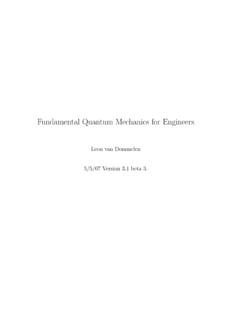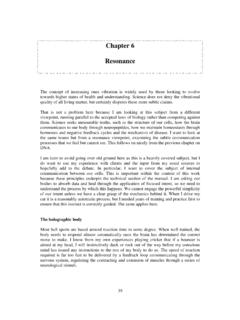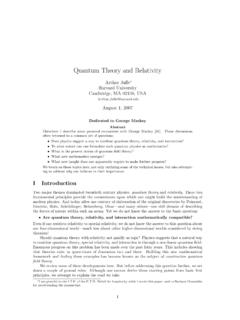Transcription of Awakening your Soul or - Fred Alan Wolf
1 Awakening your Soul or:Becoming aware that you are a Spiritual UniverseBY FRED ALAN WOLF, designed to expose quantum physics principles have shown that observingnature depends on choices made by the observer. These experiments lead to newconcepts describing the relation between an observer and the thing observed. Theseconcepts also can be applied to subjective observation and hence to observing andawakening the soul. The popular aphorism, what you see is what you get, appears toapply to the world we experience as out there. However an equally appropriate maximappears to be, what you see is what you expect. When applied to observation of the soul,the two maxims show that you also have two complementary ways to observe yoursubjective reality: spiritually and materially. In this article National Book Award winnerDr.
2 Fred Alan Wolf shows us how this most modern perspective of quantum physics canbe applied to the questions: How do I awaken my soul consciousness? How do I becomeaware that I am (not just have) spiritual nature? By learning to invoke both aphorisms thesoul can be awakened and you can feel its presence in every thing you old adage what you see is what you get appears to apply to the world we see allaround us. However, we little appreciate that a different way of observingcomplementary to the adage exists. It states what you see is what you expect. Theseadages may appear to be saying the same thing, but the two are really quite difference arises from understanding some principles of quantum physics andspiritual practice. Our appreciation of these principles will help us to grasp conceptuallywhat it means to awaken our accomplish soul Awakening , we first look at how and why the world is not as itseems.
3 This helps us grasp the quantum physics principles involved, particularly howobservation changes the world. Next we see how and where we lose our soul awareness,and why this naturally occurs as a result of our desire for objective or out there stimulation. This helps us grasp the spiritual practice principles involved. Next weexplore three simple secrets of Awakening our soul. Finally after reviewing the threesecrets, we conclude with an imaginary dialogue with our WORLD IS NOT AS IT SEEMSMost of us take it for granted that we see the real world. Of course we know that muchmore of the world exists than what we see with our eyes. There are worlds of sounds,smells, tastes, skin sensations, and thoughts. Although those worlds may appear to bedistinct because they appeal to different sense organs, we nevertheless take it for grantedthat each sense organ only picks out from the world-in-total a particular aspect of thatworld that registers on that particular sense organ.
4 We rarely consider that any otherPage 2world exists, although we have learned from the practices of science that the worldconsists of far more that just that world we sense with our normal different is the world of quantum physics from the everyday physical worldthat we experience using our normal conditioned senses? As a physicist I have learnedthat it is very different, however the difference may not be easily appreciated bynonscientists. The quantum physical worldview leads to observations often verydissimilar from the world we ordinarily see. Usually the dissimilarity is difficult to see ineveryday life. According to quantum physics principles, there is no reality until thatreality is perceived. This means that the world cannot simply exist independently fromthe means used to perceive that world.
5 We call this the observer effect, long unsuspected in the physics before quantum physics, first came asa big surprise to the early scientists who discovered it. They saw, at times much to theirdismay, that any time they attempted to perform an observation on an atomic orsubatomic system, the tools they used to make the observation appeared to introduceuncontrollable errors into their measurements. They were as the adage pictures, bulls inthe china shop when they attempted to make such refined measurements. However,they soon realized that it wasn t the tools that made the errors in their determinations, butthat they had stumbled on a very stubborn part of nature herself. Like a mysterious fandancer, she always kept part of herself hidden. But when asked to reveal herself, shedemanded that each observation, regardless of the measuring tool employed, make itsmark on the thing being observed in a completely irreversible and often unpredictableway.
6 Whether they liked it or not every observer ended up disturbing the thing he or shesought to look at. This observation went far beyond eyes alone, and included any sense ahuman being used to observe from listening to tones coming from an instrument such as aGeiger counter, or watching dots on a flashing oscilloscope. Since anything reveled byobservation depended on the observers choices, nature demanded that we must be anintegrated part of herself, even though our minds sought to believe that a natural andphysical world existed objectively separated from we usually don t pay attention to ourselves in the perception processesinvolved in observation, our immediate experience will not appear to show that ouractions of perception changed anything. To our unsophisticated minds it just seems wemake errors.
7 However, if we construct a careful history of our perceptions they oftenshow us that our way of perceiving indeed changes the course of our observations andeven our personal history. Further examination shows that by making different choices,not only would our perceptions of the outcomes change, but also the very things we wereobserving would also exhibit traits that would not have appeared had we not looked may make sense to you when looking at something new and deciding what itmeans. But you may wonder, I m not actually changing reality, am I? I m justchanging my interpretation of reality. The answer is often difficult to appreciate, but as surprising as it may seem, youare changing reality simply by observing it. In the world described successfully byquantum mechanics, ultimately and fundamentally observers affect the universewhenever they observe it or anything in it.
8 If we refine our ability to see by looking atatomic and subatomic processes with sophisticated instrumentation the differences wouldPage 3be quite magnified from our normal way of seeing and would appear astonishing to PRINCIPLE OF COMPLEMENTARITYP hysicists observations of nature taught us a new principle of physics exists in the I simply put it the principle states, what you see is what you expect. By choosing oneway to see the world, another equally likely aspect of that world becomes have carefully made a map of the way our expectations alter our perception ofthe world. They noticed that there were always two complementary ways of me give you an everyday example. Suppose you are a student of you learn how to listen to music, particularly how to hear rhythms, motifsor themes, and the notes different instruments sound.
9 While listening to a particular pieceof music, you can find yourself listening to particular instruments, say the violins or thetrumpets, and by focusing your mind you can pay attention to each note played, and tothe beat of the music. Or if you wish you can pay attention to the theme or the blendingof the music into a whole. You find from your listening experiences that you can t doboth at the same time. In fact paying attention to themes alters your ability to hear notes,while paying attention to notes alters you ability to hear the melodies. This alteration inyour observing ability illustrates a principle of complementarity that exists in another example. While you are speaking to someone, you most likely findyourself not paying attention to the individual words, consonants, or vowels you use,while you focus on the meanings and nuances of your sentences.
10 However, at times, youfind that you must stop speaking and momentarily search your memory for a particularword. Maybe you notice that once you find that word you have to go back andreconstruct your sentence all over again. This illustrates how a principle ofcomplementarity exists in your thought the most astonishing fact that emerges from a quantum physical study ofmatter and energy is that a complementarity of our choices effects the results we doobserve in a manner similar to the examples shown above, yet somewhat differently. Inother words what you choose to observe can not only nullify your ability to observeanother complementary aspect, it can render it nonexistent. The difference tells us thatwhat you observe not only hides the complementary aspect from your sensory awareness,it renders it imaginary altogether.




